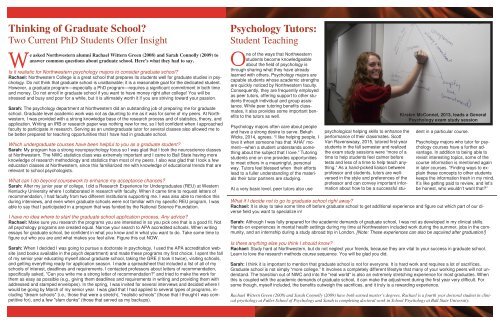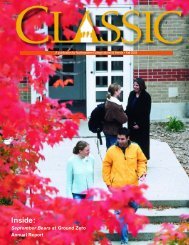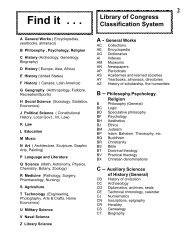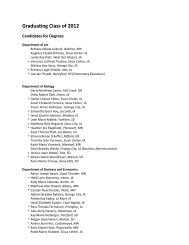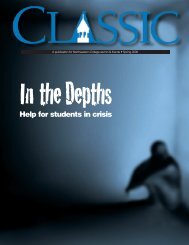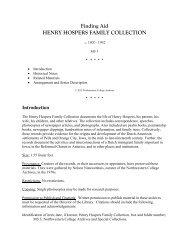2012 Psych Newsletter (Compressed) - Northwestern College
2012 Psych Newsletter (Compressed) - Northwestern College
2012 Psych Newsletter (Compressed) - Northwestern College
Create successful ePaper yourself
Turn your PDF publications into a flip-book with our unique Google optimized e-Paper software.
Thinking of Graduate School?<br />
Two Current PhD Students Offer Insight<br />
W<br />
e asked <strong>Northwestern</strong> alumni Rachael Wittern Green (2008) and Sarah Connolly (2009) to<br />
answer common questions about graduate school. Here’s what they had to say.<br />
Is it realistic for <strong>Northwestern</strong> psychology majors to consider graduate school?<br />
Rachael: <strong>Northwestern</strong> <strong>College</strong> is a great school that prepares its students well for graduate studies in psychology.<br />
Do not think that graduate school is unattainable; it is a reasonable goal for the dedicated student.<br />
However, a graduate program—especially a PhD program—requires a significant commitment in both time<br />
and money. Do not enroll in graduate school if you want to have money right after college! You will be<br />
stressed and busy and poor for a while, but it is ultimately worth it if you are striving toward your passion.<br />
Sarah: The psychology department at <strong>Northwestern</strong> did an outstanding job of preparing me for graduate<br />
school. Graduate level academic work was not as daunting to me as it was for some of my peers. At <strong>Northwestern</strong>,<br />
I was provided with a strong knowledge base of the research process and of statistics, theory, and<br />
application. Writing an IRB or research paper was nothing new for me, so I felt confident when I approached<br />
faculty to participate in research. Serving as an undergraduate tutor for several classes also allowed me to<br />
be better prepared for teaching opportunities that I have had in graduate school.<br />
Which undergraduate courses have been helpful to you as a graduate student?<br />
Sarah: My program has a strong neuropsychology focus so I was glad that I took the neuroscience classes<br />
at <strong>Northwestern</strong>. The NWC statistics class was extremely important and I came to Ball State having more<br />
knowledge of research methodology and statistics than most of my peers. I also was glad that I took a few<br />
education classes at <strong>Northwestern</strong>, since this familiarized me with knowledge of educational trends that are<br />
relevant to school psychologists.<br />
What can I do beyond coursework to enhance my acceptance chances?<br />
Sarah: After my junior year of college, I did a Research Experience for Undergraduates (REU) at Western<br />
Kentucky University where I collaborated in research with faculty. When it came time to request letters of<br />
recommendation, I had faculty from two different institutions supporting me. I was also able to mention this<br />
during interviews, and even when graduate schools were not familiar with my specific REU program, I was<br />
able to say that I participated in a program that was funded by the National Science Foundation.<br />
I have no idea where to start the graduate school application process. Any advice?<br />
Rachael: Make sure you research the programs you are interested in so you pick one that is a good fit. Not<br />
all psychology programs are created equal. Narrow your search to APA accredited schools. When writing<br />
essays for graduate school, be confident in what you know and in what you want to do. Take some time to<br />
figure out who you are and what makes you feel alive. Figure this out NOW.<br />
Sarah: When I decided I was going to pursue a doctorate in psychology, I used the APA accreditation website<br />
(and books available in the psych department) and made these programs my first choice. I spent the fall<br />
of my senior year educating myself about graduate school, taking the GRE (I took it twice), visiting schools,<br />
and getting everything ready for application season. I made a spreadsheet that included a list of all of my<br />
schools of interest, deadlines and requirements. I contacted professors about letters of recommendation,<br />
specifically asked, "Can you write me a strong letter of recommendation?" and tried to make the work for<br />
them as easy as possible (e.g., giving them deadlines and requirements in writing and providing them with<br />
addressed and stamped envelopes). In the spring, I was invited for several interviews and decided where I<br />
would be going by March of my senior year. I was glad that I had applied to several types of programs, including<br />
"dream schools" (i.e., those that were a stretch), "realistic schools" (those that I thought I was competitive<br />
for), and a few "slam dunks" (those that served as my backups).<br />
<strong>Psych</strong>ology Tutors:<br />
Student Teaching<br />
O<br />
ne of the ways that <strong>Northwestern</strong><br />
students become knowledgeable<br />
about the field of psychology is<br />
through sharing what they have already<br />
learned with others. <strong>Psych</strong>ology majors are<br />
capable students whose academic strengths<br />
are quickly noticed by <strong>Northwestern</strong> faculty.<br />
Consequently, they are frequently employed<br />
as peer tutors, offering support to other students<br />
through individual and group assistance.<br />
While peer tutoring benefits classmates,<br />
it also provides some important benefits<br />
to the tutors as well.<br />
<strong>Psych</strong>ology majors often care about people<br />
and have a strong desire to serve. Bekah<br />
Wicks, 2014, agrees. “I like helping people. I<br />
love it when someone has that ‘AHA!’ moment—when<br />
a student understands something<br />
about the subject that I love.” Tutoring<br />
students one on one provides opportunities<br />
to meet others in a meaningful, personal<br />
way. Tutors feel blessed when their efforts<br />
lead to a fuller understanding of the materials<br />
their tutor partners are studying.<br />
At a very basic level, peer tutors also use<br />
Kirsten McConnel, 2013, leads a General<br />
<strong>Psych</strong>ology exam study session<br />
psychological helping skills to enhance the<br />
performance of their classmates. Scott<br />
Van Ravenswaay, 2015, tutored first-year<br />
students in the fall semester and realized<br />
the exam study sessions were “more of a<br />
time to help students feel calmer before<br />
tests and less of a time to help teach anything.”<br />
As a hand-picked liaison between<br />
professor and students, tutors are wellversed<br />
in the style and preferences of the<br />
professor and can convey important information<br />
about how to be a successful student<br />
in a particular course.<br />
<strong>Psych</strong>ology majors who tutor for psychology<br />
courses have a further advantage.<br />
In addition to being able to<br />
revisit interesting topics, some of the<br />
course information is mentioned again<br />
in later courses. “Finding ways to explain<br />
these concepts to other students<br />
keeps the information fresh in my mind.<br />
It’s like getting paid to review, and let’s<br />
be honest, who wouldn’t want that?”<br />
What if I decide not to go to graduate school right away?<br />
Rachael: It is okay to take some time off before graduate school to get additional experience and figure out which part of our diverse<br />
field you want to specialize in!<br />
Sarah: Although I was fully prepared for the academic demands of graduate school, I was not as developed in my clinical skills.<br />
Hands-on experiences in mental health settings during my time at <strong>Northwestern</strong> included work during the summer, jobs in the community,<br />
and an internship during a study abroad trip in London. [Note: These experiences can also be aqcuired after graduation!]<br />
Is there anything else you think I should know?<br />
Rachael: Study hard at <strong>Northwestern</strong>, but do not neglect your friends, because they are vital to your success in graduate school.<br />
Learn to love the research methods course sequence. You will be glad you did.<br />
Sarah: I think it is important to mention that graduate school is not for everyone. It is hard work and requires a lot of sacrifices.<br />
Graduate school is not simply “more college.” It involves a completely different lifestyle that many of your working peers will not understand.<br />
The transition out of NWC and into the "real world" is also an extremely stretching experience for most graduates. When<br />
this is coupled with the academic demands of graduate school, it can make the adjustment during the first year very difficult. For<br />
some though, myself included, the benefits outweigh the sacrifices, and it truly is a rewarding experience.<br />
Rachael Wittern Green (2008) and Sarah Connolly (2009) have both earned master’s degrees. Rachael is a fourth year doctoral student in clinical<br />
psychology at Fuller School of <strong>Psych</strong>ology and Sarah is completing doctoral work in School <strong>Psych</strong>ology at Ball State University.


